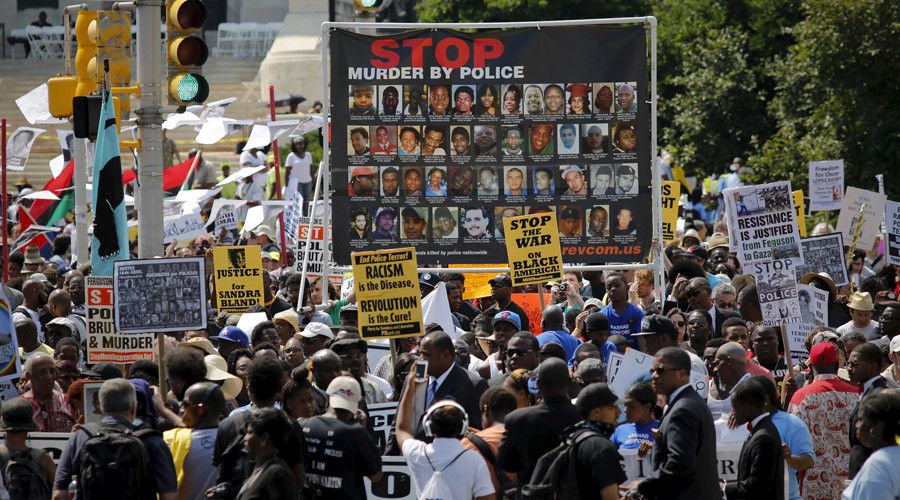 National anti-police brutality protests, following the deaths of Eric Garner, Michael Brown, Tamir Rice and Freddie Gray, have propelled state lawmakers to pass dozens of police reform measures. However, activists want more concrete changes.
National anti-police brutality protests, following the deaths of Eric Garner, Michael Brown, Tamir Rice and Freddie Gray, have propelled state lawmakers to pass dozens of police reform measures. However, activists want more concrete changes.
In 24 states, 40 new measures to change the way police interact with the public have been introduced since the Ferguson protests. The measures include body-worn cameras, limits on military equipment for use by law enforcement, racial bias awareness training and independent investigations, according to an analysis by the Associated Press.
"What we have right now in the country is an emerging consensus as to the need to act," NAACP President Cornell William Brooks told AP. "What we don't have is a consensus as to how to act, what to act on and how to do this in some kind of priority order."
Sixteen states passed body-camera measures. Some were laws, others were resolutions to create study panels or provide state grants subsidizing the purchases of the cameras. Others were new laws detailing how they could be used.
A study conducted with the Rialto Police Department in California found that complaints about police dropped by 88 percent and the use of force dropped by 59 percent when cameras were instituted.
New York City began a small pilot program involving 54 body cameras in four precincts in 2014 and 2015, following pressure by the city's Public Advocate Letitia James. Notably, the use of body cameras came not directly from the pressure of the Black Lives Matter movement, but from one of the recommended findings in the federal court case Floyd v. New York City. That case found the police department unfairly targeted African-Americans and Latinos during stops known as Stop, Question and Frisk.
The AP reported that just three states – Colorado, Connecticut and Illinois – introduced packages of legislation for police reform including body cameras, police training on racial biases, and requirements for independent investigations when police shoot people.
In Missouri, despite the introduction of 65 bills, lawmakers only passed one measure limiting municipal court fines and traffic tickets. This came in response to a scathing report by the Justice Department that found African-Americans to be unfairly targeted for ticketing and fines.
The AP reported that the Rev. Al Sharpton described Missouri's response as “disappointing" and indicative of an “institutional denial" of the need for change.
Governors in other states made changes without waiting for lawmakers to act. New York Governor Andrew Cuomo signed an executive order directing the appointment of a special prosecutor to investigate police killings of unarmed civilians.
The demand for the reappointment of a special prosecutor became more earnest after a New York grand jury failed to indict the police officer involved in the death of Eric Garner, who was killed via a chokehold. Families in the city who lost loved ones to police brutality have called for such an appointment for several decades.
“In regards to the executive order for the special prosecutors that the governor signed, it was a phenomenal victory. It is something that families have wanted for over 20 years," Daniel 'Majestic' Sanchez, a spokesperson for the Justice Committee police reform advocacy group, told RT at the one year anniversary rally for Eric Garner.
“Because local district attorneys have an inherent conflict of interest … it is not saying that DAs are bad people, or unethical … it is just, for all intents and purposes, they would be trying to prosecute their co-workers, and it is not in their interest to do so."
In Ohio, following the death of the 12-year-old boy Tamir Rice by a rookie Cleveland patrolman in November, who mistook a pellet gun for a real one, Governor John Kasich created a panel to develop the state's first-ever standards for police use of deadly force.
Ezekiel Edwards, director of American Civil Liberties Union's criminal law reform project, told AP that states won't make real progress until they provide better education, employment and housing opportunities for residents.
“[There] is a massive amount of work that is left to do going forward," he said.
Source: rt.com
 В Атырау -10
В Атырау -10